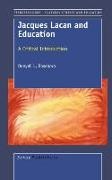Read more
This is an introductory level text with emphasis on Lacan's theoretical relationship to education and which uses Lacan's theories as a springboard for a different educational discourse, one that forces us to assess inward rather than outward. To move beyond the linear nature of schools, a context exacerbated by developmental psychologists like Piaget and Erikson who theorized that we can understand children's development in stages, the author argues that Lacan's theories allow us to holistically educate - to teach cognizant of the relationship between interior and exterior spaces, between the unspoken and the heard. The text serves four purposes: 1) to translate Lacan's primary ideas into language appropriate for introductory level college students, 2) to examine identity in ways that are relevant across disciplines, 3) to re-frame Lacan's work with post-structuralist and postmodern theories and, in so doing, create a distinctive analysis of the self predefined yet reinvented, and 4) to juxtapose Lacan's work with post-formal thinking and theorize about his relevance to public education.
This book is purposefully organized with specific emphasis on Lacan's work as a teacher and the ways in which his theories complicate current accountability standards in the United States which insist that "good" teaching and learning is quantifiable. The author foregrounds Lacan's concepts of identity and language and analyzes those in parallel to the discourses of democratic education. Lacan's theories do provide some indelible possibilities for public education in the twenty-first century. Considering his relevance to post-structuralism, post-formalism, post colonialism, and postmodernism, a Lacanian perspective of public education would defy the current standardization of curriculum in the wake of No Child Left Behind (NCLB) mandates. Using Lacan, the author re-envisions public education as a process which encourages the distinctiveness of students, challenges normative assumptions about what a "good" student is, and demands that teachers facilitate student understanding of multiple truths but that teachers also engage in an honest reconstruction of history-one that acknowledges the brutality of conquest, the arrogance of imperialism, and the illusiveness/elusiveness of peace.
Using the South African Truth and Reconciliation process as a framework, the author ends by constructing a model for public education which is grounded in "truth-telling" in public spaces, "witnessing" as a political practice, and educating as purposeful work. A Lacanian, post-formal curriculum, at its core, thus requires that we seek and identify truths, we work to become integrated beings by hearing the unconscious (that which we do not want to or cannot face), and that we educate for goodness and wholeness. This book is ultimately a call to re-envision the current public educational system in the U.S., a call to admit that it has inexcusably failed far too many children, and a call to construct entirely different possibilities.

